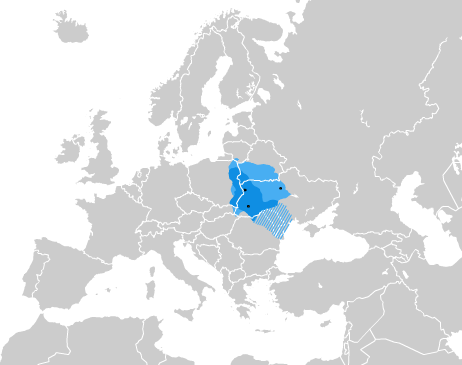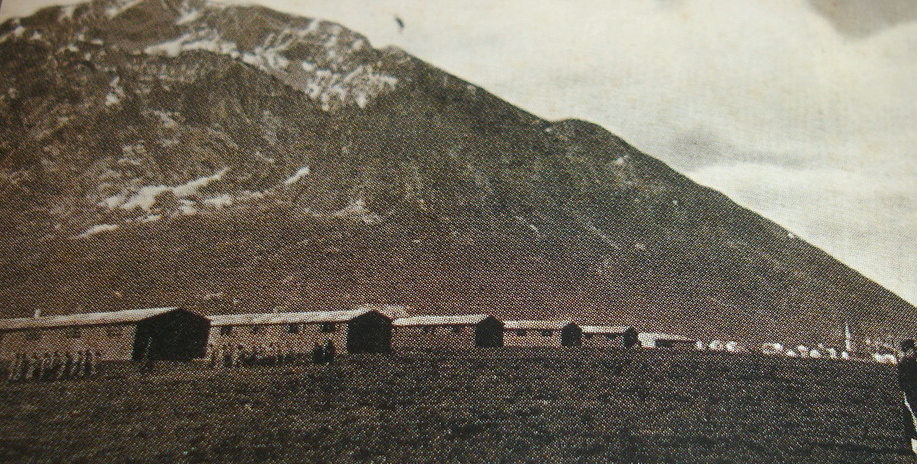|
Alexander Dukhnovych
Alexander Vasilyevich Dukhnovych (24 April 1803 – 30 March 1865) was an Transcarpathian Ruthenian priest, poet, writer, pedagogue, and social activist of the Russophile orientation. He is considered as the awakener (Rusyn: Будитиль, ''Budytyl’'') of the Rusyns. Life Alexander Dukhnovych was born in the village of Topolya, Kingdom of Hungary (now Topoľa in Eastern Slovakia). The son of a Greek Catholic priest, he went to a Hungarian school in Ungvár (now Uzhhorod) (1816 to 1821). Later Alexander studied philosophy at an academy in Kassa (now Košice) (1821–1823), and theology at the Theological Seminary in Ungvár (Uzhhorod) (1824–1827). In (1827–1830 and 1832), Dukhnovych worked as an archivist and a teacher. Later, in 1833-1838, he worked as a Greek Catholic priest in remote villages of Carpathian Ruthenia (present-day Zakarpattia oblast of Ukraine) and as a notary in Ungvár (Uzhhorod) (1838–1844). Dukhnovych started to write poems in his early years. ... [...More Info...] [...Related Items...] OR: [Wikipedia] [Google] [Baidu] |
:Template:Infobox Writer/doc
Infobox writer may be used to summarize information about a person who is a writer/author (includes screenwriters). If the writer-specific fields here are not needed, consider using the more general ; other infoboxes there can be found in :People and person infobox templates. This template may also be used as a module (or sub-template) of ; see WikiProject Infoboxes/embed for guidance on such usage. Syntax The infobox may be added by pasting the template as shown below into an article. All fields are optional. Any unused parameter names can be left blank or omitted. Parameters Please remove any parameters from an article's infobox that are unlikely to be used. All parameters are optional. Unless otherwise specified, if a parameter has multiple values, they should be comma-separated using the template: : which produces: : , language= If any of the individual values contain commas already, add to use semi-colons as separators: : which produces: : , pseu ... [...More Info...] [...Related Items...] OR: [Wikipedia] [Google] [Baidu] |
Hungarian Language
Hungarian, or Magyar (, ), is an Ugric language of the Uralic language family spoken in Hungary and parts of several neighboring countries. It is the official language of Hungary and one of the 24 official languages of the European Union. Outside Hungary, it is also spoken by Hungarians, Hungarian communities in southern Slovakia, western Ukraine (Zakarpattia Oblast, Transcarpathia), central and western Romania (Transylvania), northern Serbia (Vojvodina), northern Croatia, northeastern Slovenia (Prekmurje), and eastern Austria (Burgenland). It is also spoken by Hungarian diaspora communities worldwide, especially in North America (particularly the Hungarian Americans, United States and Canada) and Israel. With 14 million speakers, it is the Uralic family's most widely spoken language. Classification Hungarian is a member of the Uralic language family. Linguistic connections between Hungarian and other Uralic languages were noticed in the 1670s, and the family's existenc ... [...More Info...] [...Related Items...] OR: [Wikipedia] [Google] [Baidu] |
On-line
In computer technology and telecommunications, online indicates a state of connectivity, and offline indicates a disconnected state. In modern terminology, this usually refers to an Internet connection, but (especially when expressed as "on line" or "on the line") could refer to any piece of equipment or functional unit that is connected to a larger system. Being online means that the equipment or subsystem is connected, or that it is ready for use. "Online" has come to describe activities and concepts that take place on the Internet, such as online identity, online predator and online shop. A similar meaning is also given by the prefixes cyber and e, as in words ''cyberspace'', ''cybercrime'', ''email'', and ''e-commerce''. In contrast, "offline" can refer to either computing activities performed while disconnected from the Internet, or alternatives to Internet activities (such as shopping in brick-and-mortar stores). The term "offline" is sometimes used interchangeably w ... [...More Info...] [...Related Items...] OR: [Wikipedia] [Google] [Baidu] |
Orest Subtelny
Orest Subtelny (, 17 May 1941 – 24 July 2016) was a Ukrainian-Canadian historian. Born in Kraków, Poland, he received his doctorate from Harvard University in 1973. From 1982 to 2015, he was a Professor in the Departments of History and Political Science at York University in Toronto. Early life Orest Subtelny was born in Kraków, General Government, on 17 May 1941.Passings: Orest Subtelny made significant contributions to history research . 27 July 2016 His father, Myroslav, was a lawyer who had lived in the city in the ... [...More Info...] [...Related Items...] OR: [Wikipedia] [Google] [Baidu] |
Carpatho-Rusyn Society
The Carpatho-Rusyn Society (C-RS; ) is a non-profit cultural organization located in the United States dedicated to promoting Rusyns, Carpatho-Rusyn culture and history. It was established in Pittsburgh in 1994 and is the largest exclusively Carpatho-Rusyn organization in North America with over 3,000 members. C-RS works to educate those of Rusyn descent as well as others about Carpatho-Rusyn heritage. The society supports the preservation and development of Rusyn culture on both sides of the Atlantic. Establishment The impetus for development of C-RS emanated from the Second World Congress of Rusyns held in Krynica-Zdrój, Krynica, Poland in 1993. The new society built upon the inclusive approaches of other American Carpatho-Rusyn organizations, particularly the Carpatho-Rusyn Research Center founded in 1978 by Paul Robert Magocsi and the Rusin Association founded by Larry Goga in 1983. Formed by largely third and fourth-generation Carpatho-Rusyn Americans, C-RS was dedicated ... [...More Info...] [...Related Items...] OR: [Wikipedia] [Google] [Baidu] |
Ruthenia
''Ruthenia'' is an exonym, originally used in Medieval Latin, as one of several terms for Rus'. Originally, the term ''Rus' land'' referred to a triangular area, which mainly corresponds to the tribe of Polans in Dnieper Ukraine. ''Ruthenia'' was used to refer to the East Slavic and Eastern Orthodox people of the Grand Duchy of Lithuania and the Kingdom of Poland, and later the Polish-Lithuanian Commonwealth and Austria-Hungary, mainly to Ukrainians and sometimes Belarusians, corresponding to the territories of modern Belarus, Ukraine, Eastern Poland and some of western Russia. Historically, in a broader sense, the term was used to refer to all the territories under Kievan dominion (mostly East Slavs). The Kingdom of Galicia and Lodomeria (1772–1918), corresponding to parts of Western Ukraine, was referred to as ''Ruthenia'' and its people as ''Ruthenians''. As a result of a Ukrainian national identity gradually dominating over much of present-day Ukraine in the 19t ... [...More Info...] [...Related Items...] OR: [Wikipedia] [Google] [Baidu] |
Alexander Duchnovič Theatre
The Alexander Dukhnovych Theater (, ''Teatr Aleksandra Duxnoviča'', although the sign in the adjacent photo reads Tеатр Александра Духновича; ), located in Prešov, is the only Slovak theatre providing plays in the Rusyn language. History The Alexander Dukhnovych Theater was founded in 1945 as a Ukrainian national Theatre. In 1990 after Velvet revolution and fall of communism in Czechoslovakia it was renamed after a priest and social activist of the Rusyn nation Alexander Dukhnovych. See also * Rusyns * Paul Robert Magocsi Paul Robert Magocsi (; born January 26, 1945) is an American professor of history, political science, and Chair of Ukrainian Studies at the University of Toronto. He has been with the university since 1980 and became a Fellow of the Royal Societ ... References * * External links Alexander Duchnovič Theatre: Official site Buildings and structures in Prešov Theatres in Slovakia Tourist attractions in Prešov Region ... [...More Info...] [...Related Items...] OR: [Wikipedia] [Google] [Baidu] |
Iazychie
Iazychie (; ) was an artificial literary East Slavic language used in the 19th century and the early 20th century in Halychyna, Bukovina, and Zakarpattia in publishing, particularly by Ukrainian and Carpatho-Rusyn Russophiles (Moskvophiles).Zhovtobryukh, M.A. Iazychie'. Ukrainian Soviet Encyclopedia. It was an unsystematic combination of Russian with the lexical, phonetic and grammatical elements of vernacular Ukrainian and Rusyn, Church Slavonic, Ruthenian, Polish, and Old Slavic. The term was introduced by Ukrainophiles, who used it pejoratively. Nikolay Chernyshevsky called "Iazychie" a mutilation of the language and sharply condemned it. Ivan Franko and other representatives of the contemporary territories of today's Western Ukraine's progressive intelligentsia The intelligentsia is a status class composed of the university-educated people of a society who engage in the complex mental labours by which they critique, shape, and lead in the politics, policies, and cu ... [...More Info...] [...Related Items...] OR: [Wikipedia] [Google] [Baidu] |
Western Ukraine
Western Ukraine or West Ukraine (, ) refers to the western territories of Ukraine. There is no universally accepted definition of the territory's boundaries, but the contemporary Ukrainian administrative regions ( oblasts) of Chernivtsi, Ivano-Frankivsk, Lviv, Ternopil and Zakarpattia (which were part of the former Austro-Hungarian Empire) are typically included. In addition, Volyn and Rivne oblasts (parts of the territory annexed from the Polish–Lithuanian Commonwealth during its Third Partition) are also usually included. In modern sources, Khmelnytskyi Oblast is often included because of its geographical, linguistic and cultural association with Western Ukraine, although this can not be confirmed from a historical and political point of view. It includes several historical regions such as Carpathian Ruthenia, Halychyna including Pokuttia (the eastern portion of Eastern Galicia), most of Volhynia, northern Bukovina and the Hertsa region, and Podolia. Western Ukraine ... [...More Info...] [...Related Items...] OR: [Wikipedia] [Google] [Baidu] |
Galician Russophilia
Galician Russophilia () or Moscophilia (, ''Moskvofily'') was a cultural and political movement largely in the Kingdom of Galicia and Lodomeria, Austria-Hungary (currently western Ukraine). This ideology emphasized that since the Eastern Slavic people of Galicia were descendants of the people of Kievan Rus' ( Ruthenians), and followers of Eastern Christianity, they were thus a branch of the Russian people. The movement was part of the larger Pan-Slavism that was developing in the late 19th century. Russophilia was largely a backlash against Polonisation (in Galicia) and Magyarisation (in Carpathian Ruthenia) that was largely blamed on the landlords and associated with Roman Catholicism. Russophilia has survived longer among the Rusyn minority, especially that in Carpathian Ruthenia and the Lemkos of south-east Poland. Terminology The "Russophiles" did not always apply the term to themselves and called themselves Russians, Rusians, Ruthenians or '' Rusyny'' (Rusyns ... [...More Info...] [...Related Items...] OR: [Wikipedia] [Google] [Baidu] |
Ivan Franko
Ivan Yakovych Franko (, ; 27 August 1856 – 28 May 1916) was a Ukrainian poet, writer, social and literary critic, journalist, translator, economist, political activist, doctor of philosophy, ethnographer, and the author of the first detective novels and modern poetry in the Ukrainian language. He was a political radical, and a founder of the socialist and nationalist movement in Western Ukraine. In addition to his own literary work, he also translated into Ukrainian the works of such renowned figures as William Shakespeare, Lord Byron, Pedro Calderón de la Barca, Dante Alighieri, Victor Hugo, Adam Mickiewicz, Johann Wolfgang von Goethe and Friedrich Schiller. His translations appeared on the stage of the Ruska Besida Theatre. Along with Taras Shevchenko, he has had a tremendous influence on modern literary and political thought in Ukraine. Biography Early years Franko was born in the Ukrainian village of Nahuievychi, then located in the Austrian '' kronland'' of ... [...More Info...] [...Related Items...] OR: [Wikipedia] [Google] [Baidu] |
Adolf Dobryansky
Adolf (also spelt Adolph or Adolphe, Adolfo, and when Latinised Adolphus) is a given name with German origins. The name is a compound derived from the Old High German ''Athalwolf'' (or ''Hadulf''), a composition of ''athal'', or ''adal'', meaning "noble" (or '' had(u)''-, meaning "battle, combat"), and ''wolf''. The name is cognate to the Anglo-Saxon name '' Æthelwulf'' (also Eadulf or Eadwulf). The name can also be derived from the ancient Germanic elements "Wald" meaning "power", "brightness" and wolf (Waldwulf). Due to its extremely negative associations with the Nazi leader Adolf Hitler, the name has greatly declined in popularity since the end of World War II. Similar names include Lithuanian Adolfas and Latvian Ādolfs. The female forms Adolphine and Adolpha are far more rare than the male names. Adolphus can also appear as a surname, as in John Adolphus, the English historian. Popularity and usage During the 19th and early 20th centuries, Adolf was a popular name for ... [...More Info...] [...Related Items...] OR: [Wikipedia] [Google] [Baidu] |





